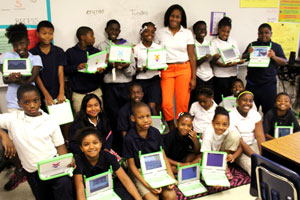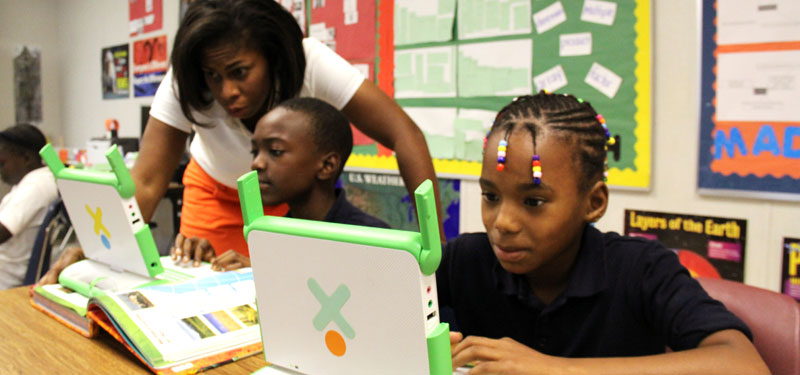Eight months after providing 2,200 free laptop computers for elementary-age students in eight Charlotte schools, Project LIFT is seeing results. Things are looking up.
Project LIFT is a partnership of public schools and private companies and foundations, designed to raise levels of academic performance. It’s focused on the zone of schools feeding into West Charlotte High School. Family income for about 90 percent of the 7,000 students in these schools is low enough to qualify for federal lunch subsidies.
Technology is one of the program’s four key components, and last February, Project LIFT distributed XO laptop computers to students in grades 1-3. The small, green, sturdy XOs were developed in the One Laptop Per Child program and are designed to be sold for about $150. The laptops migrated upward into the fourth grade in this academic year.
“We’re proud of the initial data we’re seeing in the first year of implementation,” says David Jessup, who leads the laptop program for Project LIFT. “Student attendance is up, behavior is improving, and there’s a shift in the way students and teachers are interacting in the classroom. To date, less than 1 percent of the machines have turned up missing.”
Jessup works with teachers to create projects that can be self-directed by students in the classroom, where students own the assignment, improve it, and then share it with their community of fellow students, teachers and parents. Rather than play Angry Birds, Jessup says, they program their own version of Angry Birds. Milagros, a fourth-grader at Bruns Academy, is one of those students. Whenever the laptops come out, she becomes a key assistant to her teacher, Cara Brown.
“In the future I want to be a teacher, because I think math and science is easy for me, and I can show kids when I’m older how to do math,” Milagros says.
 Ms. Brown likes the way programming forces students to expand their thought process, and likes the versatility of being able to use XOs to support the teaching of several subjects, including mathematics and basic literacy.
Ms. Brown likes the way programming forces students to expand their thought process, and likes the versatility of being able to use XOs to support the teaching of several subjects, including mathematics and basic literacy.
“They’re able to create thinking maps, with their vocabulary words or knowledge or content — what we’ve talked about — and then expand on it, based on what we’ve learned in the book and their own inferences,” Ms. Brown says. “When you think about some of the 21st century skills that we’re adding into the classroom, students are learning about how to create and develop their own programs, their own projects and design, and they’re able to manipulate the program use it to help better their learning. I love it because it’s very real-life and real-life applicable.”
Data indicates that less than 50 percent of Project LIFT families are connected to the internet at home, Jessup says, placing them at a disadvantage for common daily tasks. Project LIFT is supporting a low-cost option offered through Connect2Compete that provides broadband connectivity to qualified families for about $10 per month.
Jessup came to Project LIFT after an assignment with Teach for America in the Miami-Dade area in Florida.
“Teach for America definitely transformed my thoughts about where I wanted to head as a professional,” Jessup says. “There are so many inequities in what public schools are able to provide, and the only way we can bridge them is through the support of private partners.”
Photos: Bruns Academy fourth-grade teacher Cara Brown working with students and XO laptops provided through Project LIFT in Charlotte. Photos by Joe Cornelius.
